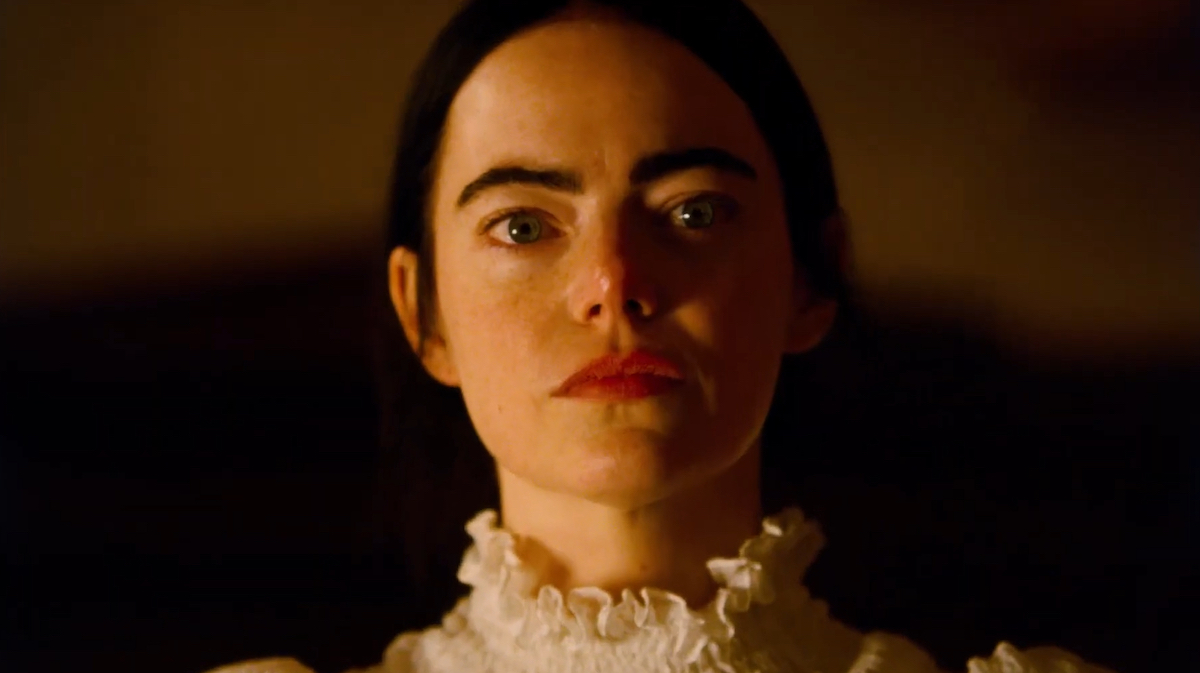‘Poor Things’ Ends on a Deliciously Complicated Note
Bellaaaaaaaaaa

Poor Things, Yorgos Lanthimos’ wild new fantasy romance, is now playing in theaters—and, forgive the pun, but this movie is worth dissecting. Poor Things is a delightfully unhinged exploration of patriarchy, sexuality, and consciousness, especially in its morally complicated ending. Let’s get into it!
This article contains massive spoilers for Poor Things!
Poor Things stars Emma Stone as Bella Baxter, the result of a fetus’ brain being implanted in its own dead mother’s body. As Bella grows and matures, she strains for freedom from her creator, Dr. Godwin “God” Baxter (Willem Dafoe) and her fiancé Max (Ramy Youssef). Bella goes on a sexual escapade with the rakish Duncan (Mark Ruffalo), traveling the Mediterranean as her intellect blossoms into a sharp, inquisitive mind.
Bella’s journey to consciousness
Poor Things is a study of the human mind, from the bodily desires of a young child to the expansiveness of a fully realized human being. At the beginning, Bella struggles to learn gross motor skills, and relishes in the simple pleasures of food and masturbation. By the end, she’s studying to become a doctor.
But the journey to consciousness is an integrative one. We don’t leave previous phases of our lives behind; we build on them. As Bella matures, she learns to contemplate her own appetites, but she doesn’t lose them. She still happily has sex as she studies medicine and philosophy. She devours knowledge as eagerly as she does pastries. Bella’s journey resembles what psychologist Carl Jung called individuation: the process of becoming the fullest, most complete version of oneself. In Bella, we get to watch the development of a human mind in fast-forward.
But Bella is a woman in a patriarchal society, and patriarchy operates on the myth that women can never be full human beings. Duncan gets angry when Bella’s sexuality starts to rival his own. When Godwin begins to miss Bella, he replaces her with another experiment, Felicity (Margaret Qualley). And Bella’s journey is almost thwarted for good when her husband—or do I mean her father?—shows up to reclaim her.
Victoria’s husband returns
Near the beginning of Poor Things, we learn that Bella’s mother, Victoria, died by suicide when she jumped off a bridge. She was pregnant, and Dr. Baxter saved her fetus by transplanting its brain into Victoria’s body. That makes Bella herself a chimera, neither Victoria nor her baby, but someone new entirely.
But she’s still wearing Victoria’s face, and people recognize her. After Bella asks Max to marry her, Victoria’s husband Alfie (Christopher Abbott) storms the wedding. To Max’s shock, Bella decides to go with him. Why does Bella go with Alfie? It may seem heartless, but Bella is driven by curiosity above all else. She wants to see the life that caused Victoria’s death.
What she finds out is horrifying. Alfie is a sadist who threatens and tortures the servants. Bella finds a notepad on which her mother wrote the word “fuck” over and over again. When Alfie realizes how rebellious “Victoria” has become, he decides to force her into a clitoridectomy to cure her “sexual hysteria.” He orders her at gunpoint to drink the sedative that will knock her out for the procedure, telling her that after her clitoris is removed, he’ll impregnate her.
That moment, by the way, is an interesting callback to Bella’s time in the Paris brothel. After she asks the brothel’s madame, Swiney (Kathryn Hunter), if men would find the sex better if they knew the sex workers enjoyed it, Swiney says the opposite is true: many men prefer sex with women who don’t enjoy it. That’s why Bella’s exuberance is so threatening to men like Duncan and Alfie: they crave feelings of power and control, and only experience those feelings at the cost of women’s happiness and autonomy.
But Bella has no intention of spending her life as Alfie’s joyless prisoner. She throws the sedative in his face, shoots him in the foot with his own pistol, and takes him back to Godwin’s home. There, she comes up with a ghoulishly elegant way to get him out of the picture. Using Godwin’s notes from her own surgery, she has Max replace his brain with a goat’s.
An ethically murky happily-ever-after
Godwin succumbs to the cancer that’s killing him, but he leaves Bella his surgical practice so that she can become a doctor. At the end of the film, Bella studies for her medical exam, relaxing in the garden with her family: Max, her friend Toinette (Suzy Bemba) from Paris, the housekeeper Mrs. Prim (Vicki Pepperdine), the maturing Felicity, and the goat who’s now inhabiting Alfie’s body.
The moral compass of Poor Things is fascinating. After seeing the devastating poverty in Alexandria, Bella is determined to help people and make the world better. Godwin talks about how his father strove to learn about the human body. But Godwin’s father experimented on his own son, and Bella frees herself from Alfie through a medical procedure as sadistic as Alfie himself. In the end, the morality in Poor Things is as complicated as the characters themselves: Bella’s act is gruesome, but it prevents Alfie from doing more harm. Godwin comes to recognize his father’s cruelty, but forgives him. There’s no good or evil in Poor Things: there are only flawed and complicated human beings, exploring the vast world around them.
And Bella, enjoying her drink as she soaks up knowledge, is the most fantastically human of them all.
(featured image: Searchlight Pictures)
Have a tip we should know? [email protected]
